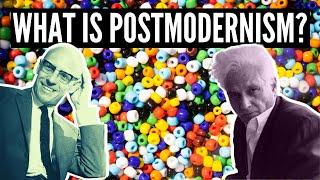
What Is Postmodernism?
Postmodernism is an intellectual movement that started in the mid to late 20th century. It is broadly defined as a form of scepticism towards grand narratives, which are ideas that postmodernists claim are unfairly said to be true for everybody, examples of grand narratives are objectivity, rationality, historical progress and identity. This scepticism manifests itself through things like subversion and irony, as well as a more general playfulness.
Get PAID For Answering Surveys- No Joke, I got £30 off of this in a week-http://qm.ee/488B3739
SUBSCRIBE HERE!-http://www.youtube.com/channel/UC__rOFCpeBWMR8EH1Dk2QwQ?sub_confirmation=1
Where you can find me!
Twitter: https://twitter.com/thatswhytv
Facebook: https://www.facebook.com/thatswhytv
Postmodernism is supposed to be the successor to Modernism, an intellectual movement that was popular in the early 20th century. Modernism holds an idealist, even utopian worldview that the state of things in the present are better than they were in the past, society is improving. Modernists thus believe that certain universal truths like reason, and historical progress are exactly that, truths and thus objective. Something that is objective relates to facts, it's free from opinion or interpretation, whereas something that is subjective relates to opinions. Postmodernists in the 50s and 60s like Derrida and Foucallt argued that objectivity doesn’t exist. Objectivity is the backbone for a series of other ideas like scientific fact and reason, which is the ability to think and understand logically. All these ideas that are much older than Modernism. They are in fact what we call enlightenment values, dating from the 18th century. In this we can see the controversial nature of Postmodernism, by rejecting objectivity it challenges the validity of the most basic and oldest of ideas.
So why do postmodernists reject objectivity? This stems mainly from the postmodernist theory of language. The enlightenment thinkers that came up with ideas such as reason and objectivity believed language was transparent- there is a firm and objective link between objects of perception, and signifiers. This might seem silly, but postmodernists reject the idea that language is transparent and objective, instead arguing that it is purely self referential, meaning all words do is refer to themselves, they have no meaning apart from the ideas we individually, subjectively associate with them. Words cannot exist apart from these ideas. Along this lines, postmodernists argue that the ideas we associate with words are heavily influenced by the culture we live in as well as our own subjective interpretation of these ideas. Because language is the key way in which we represent reality, postmodernists argue that reality cannot be considered objective as well.
Post modernists posit that the reason for the acceptance of certain ideas over any other idea is merely due to the ruling group in a society wanting to make them true. Because of this, even fields like science, are tainted by power and rendered subjective by the influence of this. For example, post modernist Luce Irigaray believed that fluid mechanics were a less researched scientific field due to the predominantly male scientists preferring mechanical engineering as it more resembles the male genitalia compared to fluid mechanics more representing female. Postmodernists thus see power as the one ruling aspect of human existence, 'the winners write the history books'. no 'the winners write everything, including the science books'.
Postmodernists also reject that we have an essence, we merely exist, and all of our experiences are equally valid and unvalid. Because of this complete lack of objectivity, post modernists thus propose that there be no divide between culture that is considered low brow and what is considered high brow. For example, how can one type of art be considered 'better' or more sophisticated than another thing if all art is just an individual's interpretation, with none being any more valid than another? A good example of this is how in the 1960s the modernist divide between lowbrow pop and highbrow classical music was blown apart by the Beatles who regularly mixed the two together. As well as this rejection of the lowbrow and high brow, Post modernists also reject what they see as grand narratives like historical progress, instead preferring to focus instead on the subjective truth of each person, which leads to a lot of breaking the fourth wall in postmodernist art. Postmodernists treat all forms of authority with skepticism.
Postmodernism arguably offers nothing analytical, it is reductive arguing that nothing can be proven or disproven because there is no objectivity. This is paradoxical, essentially arguing that it is true there is no truth.
Sources: https://docs.google.com/document/d/e/2PACX-1vRYEhroa19A_nOzpITRySJA2Ua9hoBQxzh7rUs1XeGrtyRMY2jsR0J1-zs5dW2UqilK0QcmL-lfKFUB/pub
Get PAID For Answering Surveys- No Joke, I got £30 off of this in a week-http://qm.ee/488B3739
SUBSCRIBE HERE!-http://www.youtube.com/channel/UC__rOFCpeBWMR8EH1Dk2QwQ?sub_confirmation=1
Where you can find me!
Twitter: https://twitter.com/thatswhytv
Facebook: https://www.facebook.com/thatswhytv
Postmodernism is supposed to be the successor to Modernism, an intellectual movement that was popular in the early 20th century. Modernism holds an idealist, even utopian worldview that the state of things in the present are better than they were in the past, society is improving. Modernists thus believe that certain universal truths like reason, and historical progress are exactly that, truths and thus objective. Something that is objective relates to facts, it's free from opinion or interpretation, whereas something that is subjective relates to opinions. Postmodernists in the 50s and 60s like Derrida and Foucallt argued that objectivity doesn’t exist. Objectivity is the backbone for a series of other ideas like scientific fact and reason, which is the ability to think and understand logically. All these ideas that are much older than Modernism. They are in fact what we call enlightenment values, dating from the 18th century. In this we can see the controversial nature of Postmodernism, by rejecting objectivity it challenges the validity of the most basic and oldest of ideas.
So why do postmodernists reject objectivity? This stems mainly from the postmodernist theory of language. The enlightenment thinkers that came up with ideas such as reason and objectivity believed language was transparent- there is a firm and objective link between objects of perception, and signifiers. This might seem silly, but postmodernists reject the idea that language is transparent and objective, instead arguing that it is purely self referential, meaning all words do is refer to themselves, they have no meaning apart from the ideas we individually, subjectively associate with them. Words cannot exist apart from these ideas. Along this lines, postmodernists argue that the ideas we associate with words are heavily influenced by the culture we live in as well as our own subjective interpretation of these ideas. Because language is the key way in which we represent reality, postmodernists argue that reality cannot be considered objective as well.
Post modernists posit that the reason for the acceptance of certain ideas over any other idea is merely due to the ruling group in a society wanting to make them true. Because of this, even fields like science, are tainted by power and rendered subjective by the influence of this. For example, post modernist Luce Irigaray believed that fluid mechanics were a less researched scientific field due to the predominantly male scientists preferring mechanical engineering as it more resembles the male genitalia compared to fluid mechanics more representing female. Postmodernists thus see power as the one ruling aspect of human existence, 'the winners write the history books'. no 'the winners write everything, including the science books'.
Postmodernists also reject that we have an essence, we merely exist, and all of our experiences are equally valid and unvalid. Because of this complete lack of objectivity, post modernists thus propose that there be no divide between culture that is considered low brow and what is considered high brow. For example, how can one type of art be considered 'better' or more sophisticated than another thing if all art is just an individual's interpretation, with none being any more valid than another? A good example of this is how in the 1960s the modernist divide between lowbrow pop and highbrow classical music was blown apart by the Beatles who regularly mixed the two together. As well as this rejection of the lowbrow and high brow, Post modernists also reject what they see as grand narratives like historical progress, instead preferring to focus instead on the subjective truth of each person, which leads to a lot of breaking the fourth wall in postmodernist art. Postmodernists treat all forms of authority with skepticism.
Postmodernism arguably offers nothing analytical, it is reductive arguing that nothing can be proven or disproven because there is no objectivity. This is paradoxical, essentially arguing that it is true there is no truth.
Sources: https://docs.google.com/document/d/e/2PACX-1vRYEhroa19A_nOzpITRySJA2Ua9hoBQxzh7rUs1XeGrtyRMY2jsR0J1-zs5dW2UqilK0QcmL-lfKFUB/pub
Тэги:
#postmodernism #philosophy #what_is_postmodernism_architecture #jordan_peterson #what_is_postmodernism #postmodernism_explained #derrida #foucalt #postmodernism_documentary #postmodernist #postmodernism_marxism #postmodernist_literature #postmodernist_theory #stephen_hicks #explaining_postmodernism #modernism_vs_postmodernism #objectivity #truth #relativism #enlightenment #culture #nietzsche #modern_art #noam_chomsky_postmodernism #identity_politics #cultural_marxismКомментарии:
What Is Postmodernism?
thatswhytv
Matty Eastwood
meganjones13
Interrupting Clients
Beck Institute for Cognitive Behavior Therapy
I Fished The WRONG Lure And It COST ME
BassFishingHQ


























